Email Us

Rapid Reaction: Market Volatility
Market turbulence? We’ve got some thoughts to share.
Higher-than-expected inflation data slammed investor expectations and rippled through markets, causing a broad selloff, and we expect to see more volatility in the coming weeks.1
Why are markets selling off?
Folks hoped tamer inflation would cause the Federal Reserve to pull back on its interest rate hikes.
Unfortunately, the hot inflation data means the Fed will likely continue aggressive rate hikes in the coming months, spooking investors who expected a pivot away from higher rates. When the Fed sets higher interest rates, it increases the cost of credit across the entire economy, making mortgages, car loans, credit cards, business financing, etc., more expensive.
Investors worry that those higher rates will slow the economy (and maybe tip it into recession) and ding company performance. Higher interest rates could also make investors less willing to accept steep valuations amid risks to future earnings growth.
What could be the longer-term impact of rate hikes?
Whenever we want to understand what could happen, it’s helpful to go back in time and look at what’s happened before. While the past can’t predict the future, it’s often a helpful guide. An analysis of 12 previous rate hike cycles shows that equity markets handled tightening reasonably well overall. Across these cycles, the S&P 500 averaged a total return (including interest, dividends, etc.) of 9.4%.2

So, what can history teach us?
- Stocks tended to take rate hikes in stride over time.
- However, those historical gains didn’t come in a straight line. They included dips, shocks, selloffs, and bear markets. They even had a few recessions.
- Predictions are a murky business. While what happened in the past is helpful, it’s not a future indicator.
What’s the bottom line?
More volatility is likely in the cards in the days and weeks ahead. Our volatility metrics were triggered early in the year, and we made some defensive moves to moderate the effect of our less aggressive strategies. Our other strategies that remain in the market will seek to find opportunities within market segments but may be subject to this likely volatility. We will see positive and negative reactions as investors digest the Fed decision, economic data, mid-term elections, and Q3 corporate earnings.
However, we don’t think it’ll all be gloom and doom. The markets could be overreacting and forgetting that there’s a lot of uncertainty and margin for error in economic data. Statistical agencies must walk a thin line to get data out quickly (so it’s helpful to decision-makers) while being transparent about how much error is baked into their estimates.
We are keeping an eye on markets and the economy and will reach out with more insights as we have them.
Remember, sound financial planning accounts for market cycles such as these. Reason, not emotion, should guide our decision-making.
We appreciate your trust and confidence! Feel free to schedule with us anytime here: SCHEDULE NOW.
1 – https://www.cnbc.com/2022/09/12/stock-futures-are-higher-as-wall-street-awaits-key-inflation-report-.html
2 – https://www.truist.com/content/dam/truist-bank/us/en/documents/article/wealth/insights/market-perspective-03-18-22.pdf#page=2

